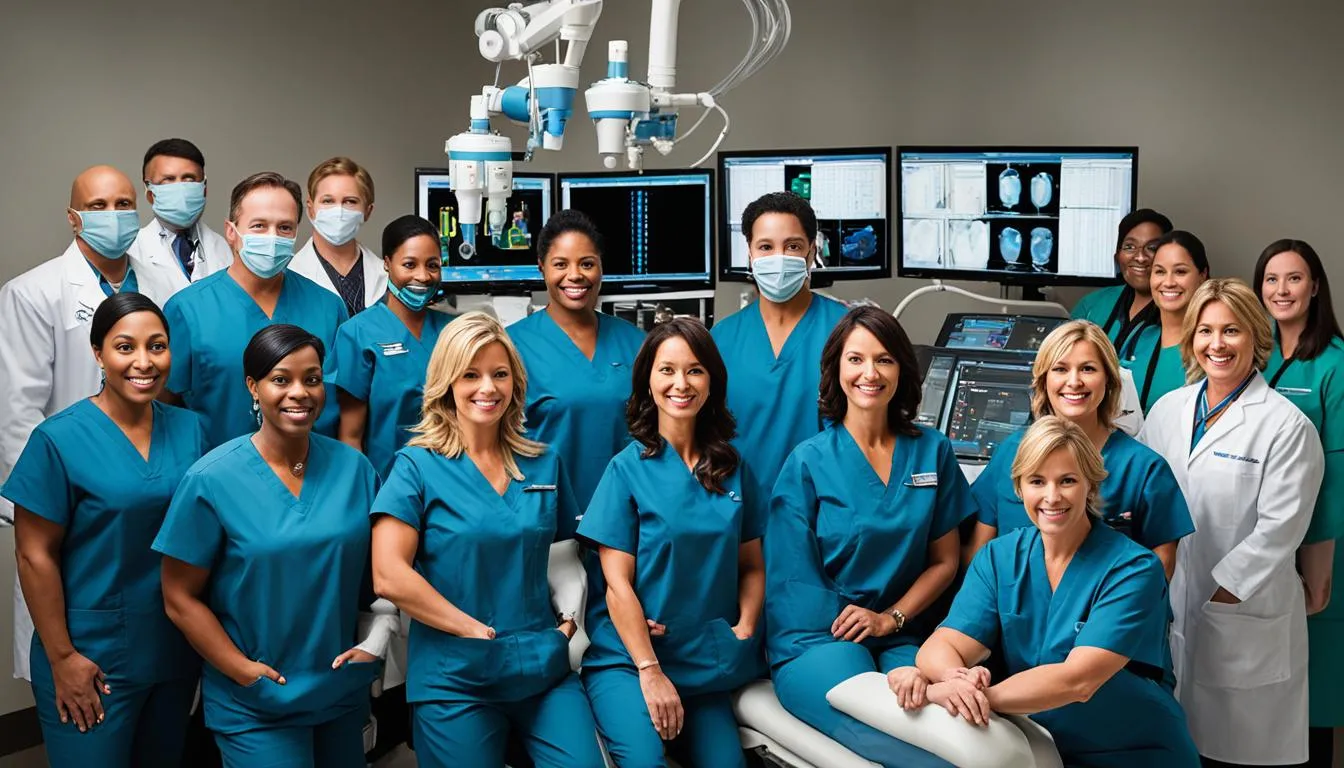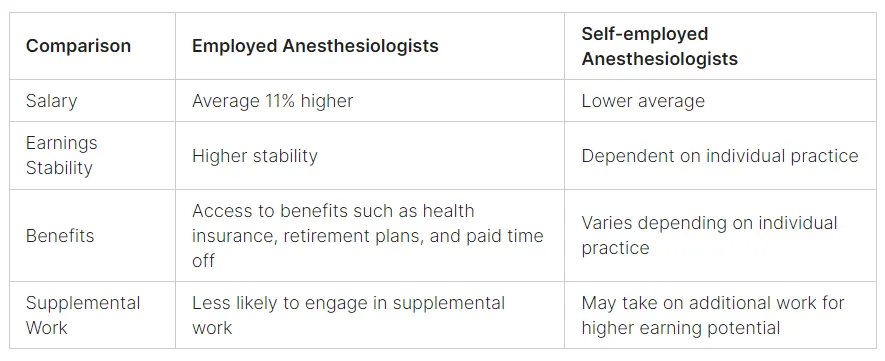Anesthesiologist Salary: How Compensation Evolves over Time

Author: Tyesia Hunter
Are you considering a career in anesthesiology? One important aspect to consider is the potential salary and how it may evolve over time. Understanding the earning potential can help you make an informed decision about your future in this field.
According to Medscape's 2022 Anesthesiologist Compensation Report, anesthesiologists continue to enjoy increasing salaries. In 2022, the average salary for anesthesiologists reached $405,000, which is a 7% increase from the previous year's average of $378,000. While this places anesthesiologists in the middle range among the specialties surveyed, it still represents a promising earning potential in the medical field.
- Anesthesiologists reported an average salary of $405,000 in 2022, a 7% increase from the previous year.
- 57% of anesthesiologists received an incentive bonus, with the average bonus amounting to $68,000.
- Anesthesiology offers a promising earning potential in the medical field.
- The field of anesthesiology is experiencing salary growth over time.
- Understanding the potential salary progression can help inform your career decisions.
Factors Influencing Anesthesiology
Compensation Growth
Several factors contribute to the growth of anesthesiology compensation. First, the demand for anesthesiologists remains high, creating a shortage of practitioners. This high demand leads to increased compensation opportunities for anesthesiologists. Additionally, anesthesiology is considered one of the highest-paying medical specialties, providing anesthesiologists with a lucrative earning potential. These factors contribute to the overall growth of anesthesiology compensation over time.
Anesthesiologists are in high demand due to their critical role in ensuring patient safety and comfort during surgical procedures. The specialized skills and expertise they possess make them indispensable in the healthcare industry. As a result, the job market for anesthesiologists remains robust, with numerous job opportunities available.
The high demand for anesthesiologists leads to increased compensation opportunities. Anesthesiology consistently ranks as one of the highest-paying medical specialties. According to the Medscape Anesthesiologist Compensation Report, the average anesthesiologist salary in 2022 was $405,000. This places anesthesiology among the highest-paying specialties in the medical field.
With anesthesiologists earning potential being one of the highest, it's no wonder why many medical students and professionals are drawn to this specialty. The combination of high demand and high compensation makes anesthesiology an attractive choice for those seeking a financially rewarding medical career.

Overall, the growth of anesthesiology compensation is influenced by factors such as the high demand for anesthesiologists and the specialty's reputation as one of the highest-paying medical specialties. These factors contribute to the continued growth of anesthesiology compensation, making it a lucrative career choice for aspiring healthcare professionals.
Related: Navigating the Pay Scale Across Career Stages
Job Satisfaction and Career Outlook for Anesthesiologists

While anesthesiologists reported a high level of job satisfaction in terms of feeling fairly compensated (53%), the survey also revealed some challenges and concerns. The COVID-19 pandemic has intensified the workplace factors for many physicians, including anesthesiologists. Only 69% of anesthesiologists surveyed stated they would pursue a career in medicine again, ranking them in the lowest quintile among specialties represented in the report. However, 86% of anesthesiologists reported they would choose their specialty again, indicating a positive outlook for their career. It's important to note that anesthesiologists have a lower administrative burden and higher earning potential compared to many other physician specialties.
- 53% of anesthesiologists reported feeling fairly compensated, indicating a high level of job satisfaction.
- Only 69% of anesthesiologists surveyed stated they would pursue a career in medicine again, ranking them in the lowest quintile among specialties.
- 86% of anesthesiologists reported they would choose their specialty again, indicating a positive career outlook.
- Anesthesiologists have a lower administrative burden and higher earning potential compared to many other physician specialties.
Despite some challenges and concerns, anesthesiology offers promising job satisfaction and a positive career outlook. While the COVID-19 pandemic has presented unique workplace factors, anesthesiologists continue to find satisfaction in their field. The lower administrative burden, coupled with the higher earning potential, makes anesthesiology an attractive career choice for healthcare professionals seeking financial stability and fulfillment.
Expert Insight:

Related: Factors Affecting Anesthesiologist Salary
Competition and Administrative Responsibilities in Anesthesiology

When it comes to the anesthesiologist job market, competition plays a role in determining earning potential. However, more than half of the surveyed anesthesiologists reported that their income is not significantly affected by competition. For those who do face competition impacting their income, one primary concern is the presence of nonphysician practitioners such as Certified Registered Nurse Anesthetists (CRNAs).
In anesthesiology, administrative responsibilities are also a factor to consider. Anesthesiologists reported spending an average of 10 hours per week on administrative tasks. While this may seem like a significant amount of time, it is lower than the overall average reported by physicians in other specialties. This means that anesthesiologists have a relatively low administrative burden compared to their peers, allowing them to focus more on patient care and their anesthesiologist careers.
Competition Impacting Income
Despite the competition in the anesthesiologist job market, it's important to note that many anesthesiologists are not directly affected by it. This could be attributed to various factors, such as the high demand for anesthesiologists or the specialized skill set they possess. By providing essential services in the perioperative care of patients, anesthesiologists have a unique position in the healthcare system that sets them apart from other medical professionals.
Administrative Responsibilities in Anesthesiology
Anesthesiologists, like all physicians, bear some administrative responsibilities. These can include tasks such as documenting patient records, managing billing and coding, and participating in quality improvement initiatives. However, compared to other medical specialties, anesthesiologists have a relatively lower administrative burden. This allows them to devote more time and energy to their anesthesiology career and provide excellent care to their patients.

Related: Anesthesiologist Salary by Specialty
Employed versus Self-employed Anesthesiologists

When considering a career as an anesthesiologist, one important decision to make is whether to be employed by a hospital, health system, or other organization or to venture into self-employment. This choice can have a significant impact on your earning potential and overall career trajectory in the field of anesthesiology.
According to Medscape's findings, anesthesiologists who are employed earn an average of 11% more than their self-employed counterparts. While self-employment is often associated with higher compensation in many physician specialties, anesthesiology differs in this regard. The stability and benefits provided by an employed position contribute to the higher average earnings.
Despite the average higher earnings for employed anesthesiologists, approximately one-third of anesthesiologists surveyed reported taking on supplemental work to supplement their income further. This supplemental work may include medical moonlighting or locum tenens opportunities. Aligning with the trend among physicians in general, 36% of anesthesiologists reported engaging in supplemental work to increase their earning potential.

In weighing the decision between employment and self-employment, it's essential to consider your personal preferences, financial goals, and risk tolerance. While employed anesthesiologists generally enjoy higher stability and benefits, self-employment offers the potential for greater autonomy and potentially higher compensation, depending on the success of the individual practice.
Conclusion
The field of anesthesiology offers a promising career path with significant earning potential. Anesthesiologists have reported steady salary growth, with compensation increasing by 7% in 2022. These increasing salaries place anesthesiologists in the middle range among surveyed specialties, indicating the favorable earning potential in the field.
Several factors contribute to the promising earning potential for anesthesiologists. The high demand for anesthesiologists, coupled with a shortage of practitioners, creates an advantageous job market with ample compensation opportunities. Additionally, anesthesiology is considered one of the highest paying medical specialties, further enhancing the earning potential for those pursuing a career in this field.
While there are challenges and concerns within the field, anesthesiologists generally report a high level of job satisfaction. Despite the intense workplace factors associated with the COVID-19 pandemic, the majority of anesthesiologists expressed a positive outlook for their career. Anesthesiologists also benefit from a lower administrative burden compared to many other physician specialties, allowing them to focus on providing quality patient care while maximizing their earning potential.
As the demand for anesthesiologists continues to rise, the career outlook remains positive. Those interested in a rewarding and financially lucrative medical career can find immense opportunities in anesthesiology. With steady salary growth, high job satisfaction, and the ability to pursue supplemental work, anesthesiology stands out as an attractive specialty choice for aspiring medical professionals.
Consider wanting a long-term position with your specialty. Anesthesiologists are in high demand as permanent hire physicians. Give us a call at 510.335.2265 to learn more or book a consultation call by using the calendar link here.
FAQ
What is the average salary of an anesthesiologist?
The average salary of an anesthesiologist is $405,000 according to the 2022 Anesthesiologist Compensation Report.
How does anesthesiologist compensation evolve over time?
Anesthesiologist salaries continue to rise, with a 7% increase from the previous year.
What are the factors that influence anesthesiology compensation growth?
Factors like high demand, a shortage of practitioners, and anesthesiology being one of the highest paying medical specialties contribute to the growth of anesthesiology compensation.
How satisfied are anesthesiologists with their job and career outlook?
While anesthesiologists generally report feeling fairly compensated, only 69% would pursue a career in medicine again. However, 86% would choose anesthesiology as their specialty again.
Does competition affect anesthesiologist income?
More than half of anesthesiologists report that their income is not affected by competition. However, those who experience competition cite nonphysician practitioners, such as Certified Registered Nurse Anesthetists (CRNAs), as their primary concern.
How do administrative responsibilities compare for anesthesiologists?
Anesthesiologists spend an average of 10 hours per week on administrative tasks, which is lower than the average reported by physicians overall. This indicates a relatively low administrative burden compared to other specialties.
Do employed or self-employed anesthesiologists earn more?
Anesthesiologists employed by hospitals, health systems, or organizations earn an average of 11% more than self-employed anesthesiologists, which is opposite to the overall physician compensation trend.
Do anesthesiologists have supplemental income opportunities?
Approximately one-third of anesthesiologists surveyed reported taking on supplemental work, such as medical moonlighting or locum tenens, to supplement their income, aligning with the trend among physicians in general.



